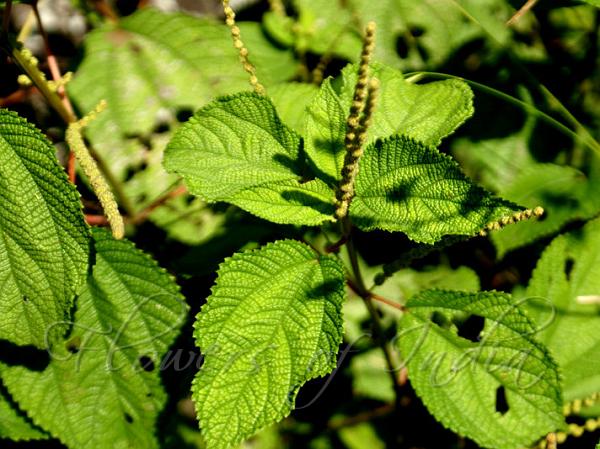|
| Rough Ramie |
|

|

| File size | 146153 |
| Original date | 9/18/11 11:39 AM |
| Resolution | 712 x 534 |
| Flash | Flash did not fire, auto |
| Focal length | 50.0mm |
| Exposure time | 1/400s |
| Aperture | 5.6 |
| Focus Distance | |
| Metering Mode | Multi-segment |
| Camera make | SONY |
| Camera model | DSLR-A100 |
| Sensor type |
|
|
|
|
Photo: |
Botanical name: Boehmeria virgata var. scabrella Family: Urticaceae (Nettle family)
Synonyms: Boehmeria scabrella, Urtica scabrella
Synonyms: Boehmeria scabrella, Urtica scabrella
Rough Ramie is a subshrub or perennial
herb, simple or few branched, 0.7-1.5 m tall. Upper stems and
branchlets are densely bristly. Leaves are opposite, nearly equal in
size; stipules lanceshaped, 0.8-1.2 mm. Leaf-stalks are 6-8 cm long,
bristly. Leaf blade is dark green or black when dry, somewhat round,
round-ovate, or ovate, 7-17 × 5.5-13 cm, papery, secondary veins 1-3
pairs along midvein. Underside is velvety or silky along veins and
veinlets, upper surface roughish, bristly, base broadly wedge-shaped,
rounded, or flat, margin coarsely 7-14-toothed, teeth 6-20 mm,
gradually larger distally, distal ones often double-toothed, tip
sometimes inconspicuously tricuspidate, lateral cusps shorter than
terminal one. Glomerules are borne on axillary unbranched, or sometimes
few-branched, spikelike branches. Male spikes are 3-15 cm; female
spikes 7-20 cm. Male flowers are 4-merous, stalkless; tepals elliptic,
about 1 mm, bristly, fused at base. Fruiting perianth is
rhomboid-obovoid, compressed, about 1.8 mm, smooth, bristly on
shoulder, base stipitate or cuneate, apex with short neck, 2-toothed.
Rough Ramie is found in the Himalayas, at altitudes of 200-1300 m.
Flowering: June-September.
| Identification credit: Gurcharan Singh, J.M. Garg | Photographed in Chakrata, Uttarakhand. |
• Is this flower misidentified? If yes,